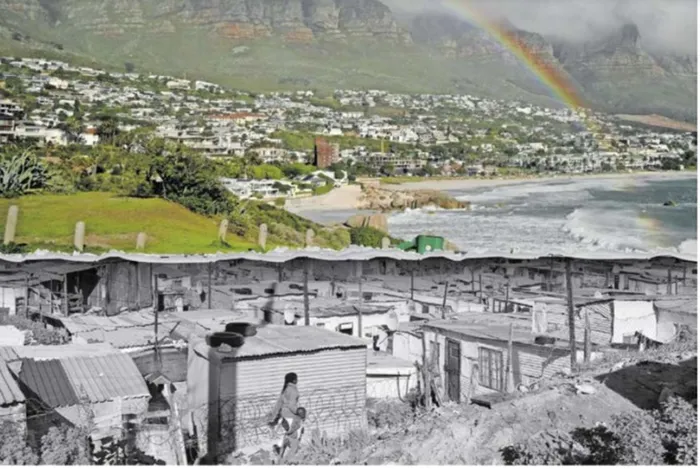
A Tale of Two Cities - Cape Town, the most unequal city in South Africa, lays bare its stark contrasts with the informal settlements of Khayelitsha against the beachfront properties of Camps Bay.
Image: Phando Jikelo and Ayanda Ndamane Independent Newspapers
President Cyril Ramaphosa says the City of Cape Town has been the worst performing between 2011 and 2022 in service delivery areas, including refuse removal, piped water, electricity and flush toilets for its residents.
However, Ramaphosa acknowledged that the metro tends to perform well on measures of financial governance.
He made the remarks during a question-and-answer session in the National Council of Provinces (NCOP) in Parliament on Tuesday.
Ramaphosa was responding to a question from ANC NCOP member Kenny Mmoiemang, who wanted to know if the government had identified the main causes of poor service delivery in many townships and informal settlements across the Cape Town metropolitan area, and what plans were in place to expedite basic service delivery there.
“The City of Cape Town shares many of the challenges faced by other metros, including rapid urbanisation and population shifts, which increase pressure on services such as housing, water and sanitation,” he said.
Ramaphosa said that the legacy of apartheid spatial planning placed many townships and informal settlements far from economic hubs and service centres.
“While the City of Cape Town tends to perform well on measures of financial governance, it has not demonstrated significant progress in reducing inequality within the metro,” he said.
“Census data shows that between 2011 and 2022, Cape Town performed worse than the average of all metros in expanding access to services such as refuse removal, piped water, electricity and flush toilets.”
The City is led by the DA.
He said analysis of the City’s budget suggests that per capita investment in infrastructure and service delivery remains significantly lower in townships and informal settlements than in more affluent areas.
“In the spirit of cooperative governance, the national government works with municipalities across the country, including the City of Cape Town, to address these and other challenges,” Ramaphosa said.
He added that assistance includes conditional grants for infrastructure and capacity building, technical support programmes, and training for municipal officials.
“The national government is committed to working with provincial governments and municipalities to ensure all citizens enjoy equal access to quality services. This is an area we are focusing on as we lead reforms at the municipal level to address the challenges our municipalities face,” he said.
Last month, Ramaphosa, speaking as ANC president, admitted it pains him that DA-led municipalities often outperform ANC ones in service delivery, urging his party’s councillors to improve. He later clarified that his remarks praising DA-run municipalities were based on Auditor-General reports highlighting solid financial management in the Western Cape.
In response to Ramaphosa’s latest comments, Mayor Geordin Hill-Lewis said the president was attempting to do damage control after recently endorsing Cape Town’s good governance.
Hill-Lewis said Cape Town not only spends far more on pro-poor infrastructure alone than the total capital budget of any other metro, it also has the highest levels of access to reliable service delivery.
“The President is still trying to do damage control after he dared to speak the truth when he said that Cape Town and other towns governed by the DA are examples to follow. In fact, they are the only examples of progress and good governance in South Africa. Where his party governs, there is only decay, corruption, and collapsed services. That is the sea of ruin that the President presides over. The simple, irrefutable fact, is that despite the enormous challenges of poverty and unemployment that South Africans face (also thanks to the ANC), Cape Town is steadily moving forward while every other city in the country is moving backwards,” said Hill-Lewis.
He added that Cape Town has an SA-record infrastructure budget of R40 billion over three years, a full 75% of which directly benefits lower income households.
Cape Times